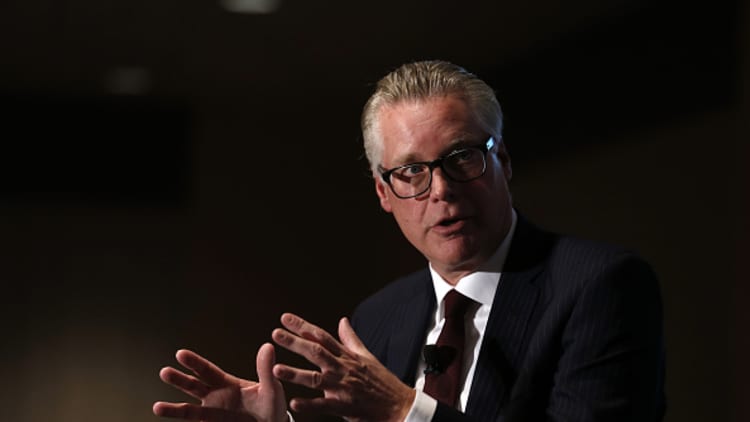Delta Air Lines on Thursday said it expects its profits to grow in 2019 thanks to higher revenue and a decline in fuel prices that ate into the sector's bottom line this year.
Delta estimated its per-share earnings next year will range from $6 to $7, in line with analyst estimates compiled by Refinitiv, and about 20 percent higher than the estimated full-year profit analysts expect for this year. It projects revenue growth of 4 to 6 percent, in line with expectations, and a 3 percent rise in capacity.
The airline's executives will outline to investors on Thursday just how the most profitable U.S. airline plans to increase its bottom line as the sector has lagged the broader market for most of the year. Delta shares are up less than 1 percent since the start of the year. The shares were down 2.2 percent in late-morning trading.
The Atlanta-based carrier's webcast investor day presentations begin at 8:30 a.m. ET.
Here are some things to watch:
Fares and routes
Delta executives in October said important corporate and premium-class bookings were strong. But investors will be curious about what they look like moving forward as well as how prepared the airline is should demand soften, which could come with lower airfares to match.
They will also be closely watching where and how many flights Delta is adding. Too much additional flying could lead to weaker fares in order to keep planes full. Delta last week said it expects revenue per available seat mile, a key industry gauge of how much money the airline is bringing in for every seat it flies a mile, to be up 3.5 percent in the fourth quarter from a year earlier, at the lower end of the forecast the airline gave in October.
Fuel and refinery
Delta executives are expected to discuss how they're digesting higher fuel costs and when and whether a recent slump in energy prices will improve the Atlanta-based carrier's bottom line. A jump in fuel costs has eaten into the bottom lines at all airlines this year.
However, strong revenue has helped Delta cover about 90 percent of the rise in fuel expenses, the airline said in a presentation it will detail during its webcast. Delta expects Brent oil prices of $65 to $70 next year, "if it fell from there it would be upside to us but the reality is we're cautious on the outlook," CEO Ed Bastian told CNBC's "Squawk Box" ahead of the airline's presentation.
The decline in fuel prices is welcome news for airlines because it's generally their second-biggest expense after labor. But investors often fret that it will encourage airlines to add more flights, and low airfares to match, to keep planes full.
Executives will also likely discuss plans for Delta's Monroe Energy oil refinery subsidiary. In September, Delta said it was working with banks to possibly create a joint venture for its Trainer, Pennsylvania, facility, to produce gasoline and diesel, in addition to jet fuel.
Cabin class updates
Delta and its rivals have divided up their economy cabins into smaller and smaller subclasses, from bare-bones basic economy that comes with few perks, to premium economy, its top-end economy tickets that come with a roomier seat, amenities kit and better dining options. Delta executives will likely provide insight into the upsell rates and how quickly the carrier's cabins are being outfitted with its new seats.
International plans
Delta has struck a slew of joint ventures and other partnerships in nearly every corner of the globe. Executives are likely to outline the state of these, and investors may be interested in how the pacts in effect are performing, particularly with airlines that have struggled like Aeromexico, in which Delta owns a 49 percent stake.
Credit card cash cow
Delta's partnership with American Express on a suite of co-branded cards has been a cash cow for the airline. Carriers make money by selling frequent flyer miles to banks that issue cards. Investors will be interested in the growth forecast for this partnership, which had come in handy as costs grew.



